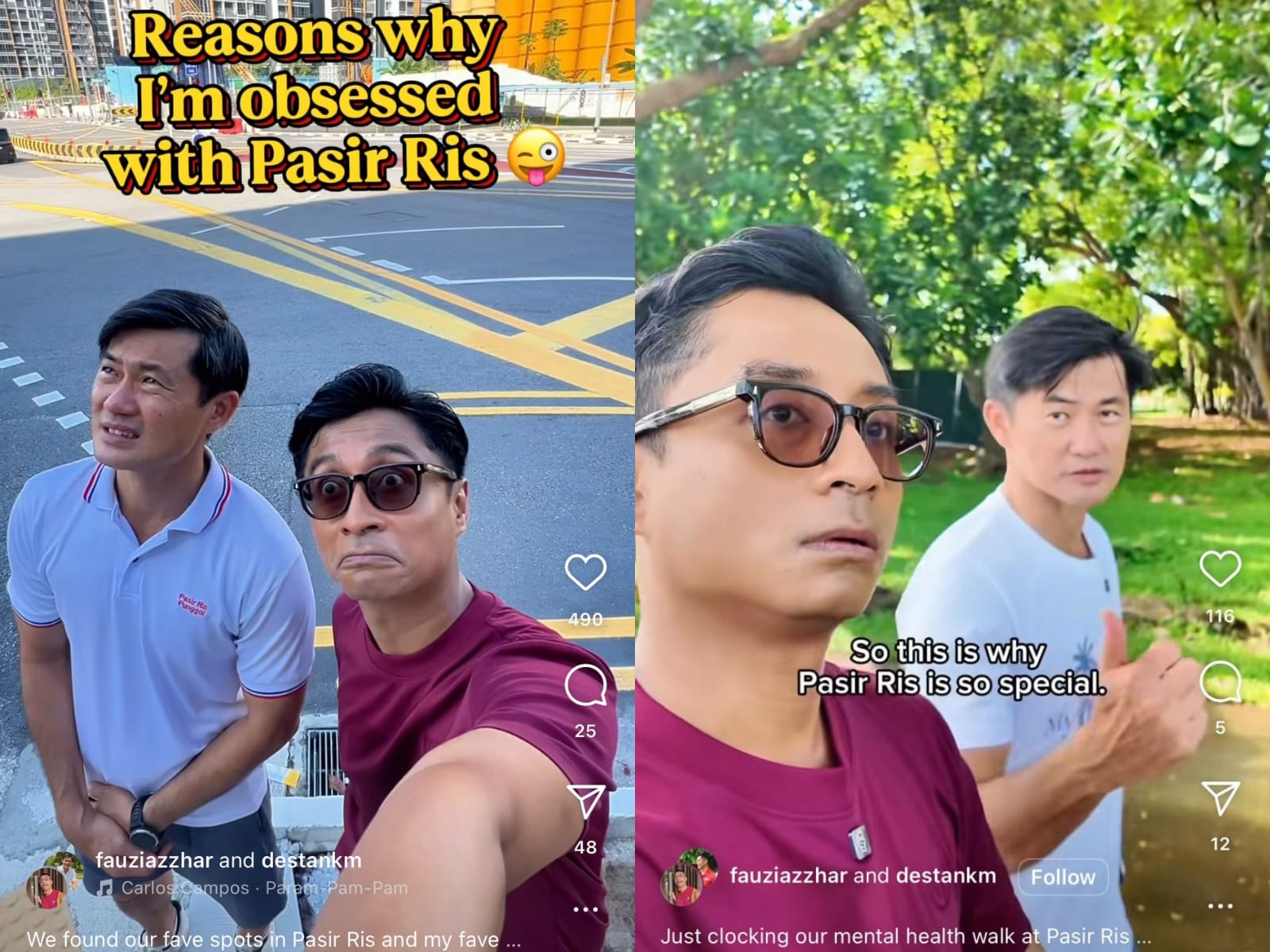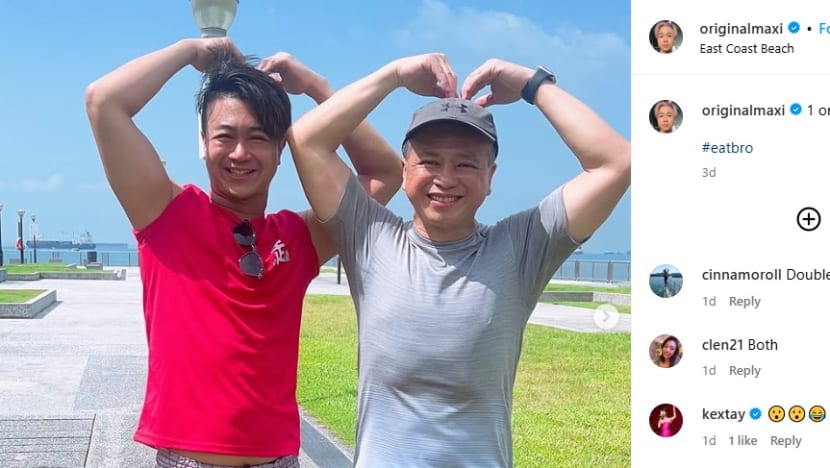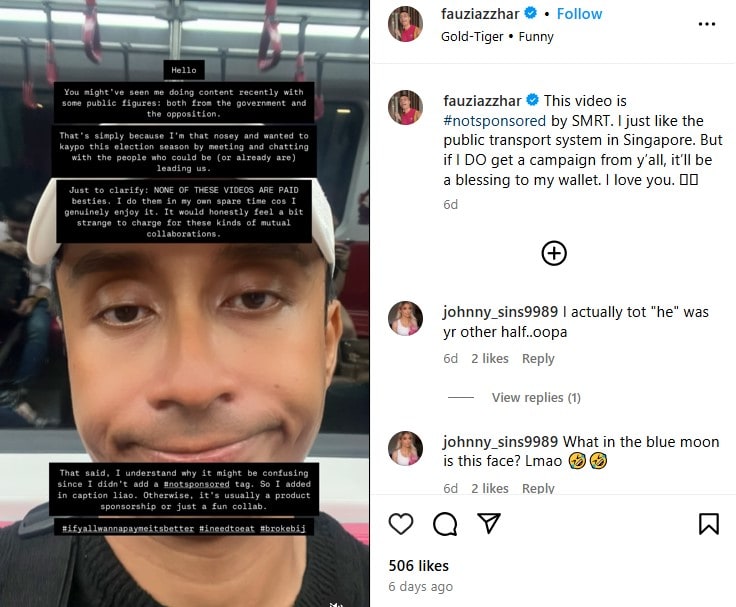GE2025: PAP politicians creating content with influencers – win-win or no-no?
SINGAPORE: From dishing out tips on how to be a Member of Parliament (MP) to playing tour guide in their constituencies, the ruling People's Action Party's (PAP) political office holders have been getting creative with online outreach efforts ahead of Singapore's May 3 General Election.
What has also grabbed attention is the presence of influencers and media personalities in some of these videos, which are often positioned as light-hearted and peppered with some comedy.
In one, Minister for Culture, Community and Youth Edwin Tong is seen showing local actor Maxi Lim the ropes of conducting a Meet-the-People session. In another, the actor takes on the role of a resident complaining about issues such as noisy roosters, leaving the minister visibly amused.
Senior Minister of State for National Development, as well as Digital Development and Information, Tan Kiat How has also appeared alongside content creator Queenie Lim from new media company SGAG, who made a video chronicling her day as an intern of a political office holder.
Another clip sees Mr Tan taking a run around the Central Business District and attempting a TikTok challenge with Mr Kao Rong Sheng, more popularly known online as Runner Kao.
Then there is Senior Minister of State in the Prime Minister’s Office Desmond Tan appearing alongside Mr Fauzi Azzhar, a former SGAG content creator, in videos showcasing various spots in Pasir Ris.
Mr Tan has been MP for Pasir Ris-Punggol GRC since 2020 and is part of the People’s Action Party’s (PAP) slate for the new Pasir Ris-Changi GRC.
Mr Fauzi and Mr Lim told CNA they were not paid for their efforts and that the videos were not part of any sponsored collaborations.
CNA also reached out to Ms Queenie Lim and Mr Kao Rong Sheng, but did not receive a response.
According to campaign guidelines announced by the Elections Department, only political parties, candidates and election agents can publish paid online election advertisements.
These refer to any material published online that can reasonably be regarded as intended to promote or prejudice the electoral success or standing of a political party or candidate.
Others can publish these advertisements only if they have written authorisation from a candidate or election agent.
All online advertisements, whether paid or unpaid, have to display the names of all the people who played an active role in publishing them.
Paid advertisements will also have to include a message or statement to indicate that they have been sponsored or paid for, as well as the names of people who paid for them.
Influencers contacted by CNA declined to reveal their rates for collaborations.
CNA understands that influencers tend to set their rate cards based on reach. This can be determined by the number of followers, as well as the potential for content to go viral. They also negotiate with clients, which means rates are not standardised or well-defined across the industry.
Responding to CNA’s queries, the PAP said its branch chairpersons work with content creators to reach out to different groups of residents and communities.
“Some collaborations are commissioned. During the elections, paid commissions will have to comply with the rules,” it told CNA via email.
The party did not respond to follow-up questions about examples of these commissioned collaborations.
The ruling party has had a "Friends of the PAP" network since 2002, which according to media reports last year has since expanded to include influencers.
The main opposition Workers’ Party, in response to a question from CNA at a press conference on Apr 20, said it does not work with social media influencers.

"EVERYTHING IS FOR COMEDIC EFFECT"
Mr Fauzi, who lives in Pasir Ris, said he approached Mr Desmond Tan at an event for residents last year.
“I told him I have a new series on exploring Singapore so maybe he can show me around Pasir Ris since he’s the MP,” said the 37-year-old.
To his surprise, Mr Tan readily agreed, and did not ask to see a script in advance.
“As you can tell from the video, we were talking over each other because we didn’t plan (or) rehearse,” said Mr Fauzi.
With content creators often turning to trending topics for inspiration, Mr Fauzi did not deny that producing videos touching on the political domain was now part and parcel of maintaining relevance and engaging audiences.
He has also reached out to other political parties and since done interviews with potential candidates from the Singapore Democratic Party and Progress Singapore Party.
“The idea is to ride on the GE wave in a light-hearted way,” said Mr Fauzi, who stressed that these were projects done out of his own personal interest.
“The fun part is simply getting to know them beyond their political roles and giving my audience a peek into their personalities.”
Mr Lim, the actor, said he had been toying with the idea of collaborating with Mr Tong since receiving comments about how he bears some resemblance to the minister. He reached out to Mr Tong last month.
At the time, the General Election was not a consideration at all, Mr Lim said, adding that he had not been keeping track of news and was not aware of the polls possibly being around the corner.
“I just thought content-wise, it would be a fun idea to be working with my 'twin',” said the 38-year-old, who is best known for his role in the Ah Boys to Men movies.
“So far, everyone has been telling me it's a collaboration that they least expected.”
The approach to the videos was decided after a discussion with Mr Tong’s team, but Mr Lim said filming was done unscripted to give room for spontaneity.
“The only thing I told (the minister) before the shoot was that I’ll be making some jokes; everything is for comedic effect so please don't be offended .... but he went with the flow and was very natural."
Mr Tong is already fairly active on social media. His team posts almost daily updates, including content produced by themselves ranging from him singing along with residents on a walkabout to a TikTok challenge with his volunteers.
He said he took up Mr Lim's collaboration pitch because it might help showcase a different side of him.
“I felt that it's useful to find a way to be relatable,” said Mr Tong, who is also Second Minister for Law.
“I guess it’s partly the portfolio and the issues that I take up in parliament, so my public persona … is a bit more serious and the reality is when you’re dealing with a contentious, difficult, complicated issue in parliament ... there isn’t a time to smile.”

Mr Tong's collaboration with Mr Lim will see several more videos being rolled out in days to come.
The General Election is certainly part of the reason behind a ramp-up of short-form, light-hearted videos on his social media pages, said Mr Tong.
But he said he does not actively seek partnerships with influencers, and that content on his pages must reflect his interests such as food, sports and music.
This was also why he agreed to be part of a recent video by local food critic KF Seetoh.
“I’ve known Mr KF Seetoh for quite a while and … I do think that what he is trying to achieve - to build a Singaporean culture through food - is very important,” said Mr Tong.
“Social media has to be a true reflection of who you are so I only have content that is work-related, constituency-related, and I guess in some ways, personality-related, because that's what people will want to know about me.”
For Mr Tan, the Senior Minister of State, Mr Fauzi’s pitch on featuring Pasir Ris came across as a "meaningful" way to share stories about the constituency.
“As MP, I am always looking for fresh ways to connect with different groups, including working with content creators beyond traditional media and my own channels,” he told CNA.
A WAY TO BE "RELATABLE AND LIKABLE"?
Politicians in Singapore have used social media to engage with their constituents for almost as long as these platforms have existed.
With a growing user base across all age groups, social media has become a key outreach tool for political parties and candidates, with the type of content changing over the years in line with trends.
For example, an increasingly prominent mix these days involves slickly produced podcasts as well as light-hearted videos.
Associate Professor Natalie Pang from the National University of Singapore (NUS) said many of these feature politicians interacting with others in a way which “can be effective in making them relatable and likable, as well as discuss the impacts of their policies on the ground in a light-hearted manner”.
“Such content sticks – people want to watch them, engage with them, and for politicians, it’s an opportunity to show a more personal side to them – not only to be likable, but also humanise themselves as politicians and gain trust,” she added.
It may also be a “win-win” with the influencers getting the chance to create content beyond their usual interests, said Assoc Prof Pang, who heads the communications and new media department at NUS.
Either way, it is “clear that social media and online content will be a part of political campaigning from now on”, said Dr Teo Kay Key, a research fellow at the Institute of Policy Studies (IPS).
At the same time, there are potential pitfalls.
For politicians, these can be fallouts from styles of content being seen as inappropriate for the topic discussed, or when engagement with influencers comes across as inauthentic or an attempt to tap on the latter’s influence instead, said Assoc Prof Pang.
“It’s also important to have a balance – too many of them without any intended messaging can backfire as they can come across as frivolous,” she added.
For influencers, scepticism about their content could emerge, resulting in a loss of trust and credibility. They may also face questions on whether they are “being politicised”, Assoc Prof Pang said.
NEED FOR TRANSPARENCY
Mr Fauzi said he has turned down commissioned projects from “some other organisations” to talk about issues related to the General Election.
“I have rejected them. I find that as a content creator, I shouldn't be seen being paid by any parties at all during this period,” he told CNA. “I don’t want to lose my credibility.”
After his video with Mr Tan was posted, Mr Fauzi received several direct messages from non-followers, questioning if he was paid for his work.
This led him to clarify on Instagram that his recent content featuring politicians from both ruling and opposition parties were not sponsored partnerships.
As a further “safety precaution”, the influencer also updated his videos with politician with a line that said: “This is not a paid partnership #notsponspored”.
“Typically, if it's a paid production, you will see ‘This is a paid partnership’ on my post but for organic videos, usually there’s no need to,” Mr Fauzi said. “But now that I know people may see it that way, I will put a line."

Experts agreed with Mr Fauzi's approach, saying it would be a good idea for politician-influencer videos to state clearly if they are formal collaborations or not.
"Influencers do post paid content, so that will help to remove doubt if they are not,” said IPS’ Dr Teo.
Beyond that, some influencers may choose to be open about their political leanings and have conversations about their beliefs with their followers, noted Assoc Prof Pang.
But fundamentally, she said, “it is a matter of being transparent”.
免责声明:投资有风险,本文并非投资建议,以上内容不应被视为任何金融产品的购买或出售要约、建议或邀请,作者或其他用户的任何相关讨论、评论或帖子也不应被视为此类内容。本文仅供一般参考,不考虑您的个人投资目标、财务状况或需求。TTM对信息的准确性和完整性不承担任何责任或保证,投资者应自行研究并在投资前寻求专业建议。
热议股票
- 1
- 2
- 3
- 4
- 5
- 6
- 7
- 8
- 9
- 10